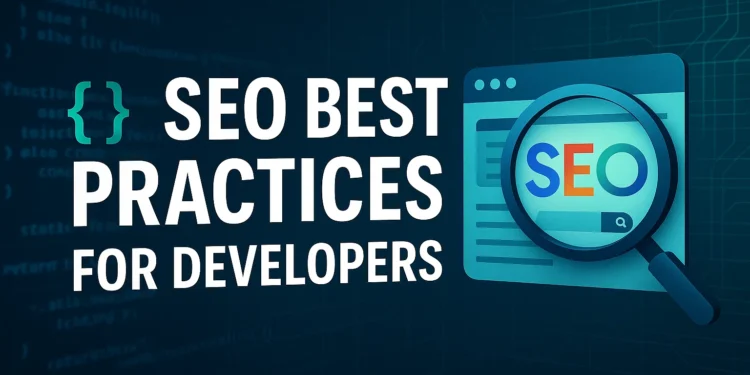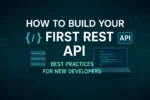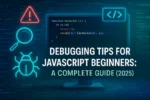SEO Best Practices for Developers in 2025

In 2025, building a website isn’t just about clean code and eye-catching design — it’s also about ensuring people can find your site through search engines. Whether you’re a developer in the USA building a SaaS platform or a UK freelancer creating portfolio websites, knowing SEO best practices for developers is crucial.
Search Engine Optimization (SEO) helps websites rank higher in Google, Bing, and other search engines, bringing in more traffic, leads, and revenue. But SEO isn’t only about keywords — as a developer, you play a huge role in technical SEO, site performance, and user experience.
This guide breaks down the SEO best practices every developer should know in 2025, with practical tips and resources.
Why Developers Need to Care About SEO
Many think SEO is only for marketers, but developers are the backbone of SEO success. Here’s why:
- Site performance depends on code → Slow-loading pages affect rankings.
- Crawlability is technical → Clean, structured code helps Google understand your site.
- Accessibility and UX are ranking factors → Developers make websites user-friendly.
Internal Link: If you’re new to web dev, check our Beginner’s Guide to HTML Basics.
External Link: Google’s SEO Starter Guide is a must-read for technical SEO.
SEO Best Practices for Developers in 2025
Here are the top practices you should implement to make your sites SEO-friendly:
1. Optimize Website Speed
Google has made it clear: page speed is a ranking factor.
- Use lazy loading for images.
- Compress CSS, JS, and HTML files.
- Use Content Delivery Networks (CDNs) like Cloudflare.
- Optimize images with modern formats like WebP or AVIF.
For hands-on coding, check our Step-by-Step Guide to Setting Up a React Project.
2. Ensure Mobile Responsiveness
With mobile traffic dominating the USA/UK, Google uses mobile-first indexing.
- Use responsive CSS frameworks (e.g., Bootstrap, Tailwind CSS).
- Test with Google Mobile-Friendly Test.
- Avoid elements that break on smaller screens.
Related Blog: Why Responsive Design Matters in 2025.
3. Implement Clean URL Structures
Search engines and users love clean URLs.
Bad: www.example.com/post?id=123
Good: www.example.com/seo-best-practices-developers
- Use hyphens (-) instead of underscores.
- Keep URLs short and descriptive.
- Avoid unnecessary parameters.
4. Use Semantic HTML
Semantic HTML helps Google understand your content.
Examples:
- Use
<header>,<footer>,<article>,<section>. - Use
<h1>–<h6>properly (one H1 per page). - Use
<alt>tags for images.
Internal Link: Check our JavaScript ES6 Features Explained with Examples to improve your coding fundamentals.
5. Optimize Meta Tags and Titles
As a developer, you can ensure:
- Every page has a unique title.
- Meta descriptions summarize content in 155–160 characters.
- Titles use target keywords naturally.
Example:
html
<title>SEO Best Practices for Developers in 2025</title>
<meta name="description" content="Learn SEO best practices for developers in 2025, including technical SEO, site speed optimization, mobile-first design, and clean coding techniques.">
6. Improve Website Security (HTTPS)
Security is not optional. Google ranks HTTPS sites higher than HTTP.
- Always install an SSL certificate.
- Redirect HTTP to HTTPS.
- Regularly update dependencies to avoid vulnerabilities.
7. Optimize JavaScript for SEO
Modern sites rely heavily on JS (React, Angular, Vue), but poorly structured JS can block crawlers.
Best practices:
- Use server-side rendering (SSR) for critical content.
- Implement dynamic rendering if needed.
- Ensure important text isn’t hidden behind JS.
External Link: Learn from Google’s JavaScript SEO basics.
8. Structure Data with Schema Markup
Schema markup (structured data) helps search engines display rich snippets (ratings, FAQs, events).
Example (JSON-LD FAQ schema):
json
{
"@context": "https://schema.org",
"@type": "FAQPage",
"mainEntity": [{
"@type": "Question",
"name": "What is SEO?",
"acceptedAnswer": {
"@type": "Answer",
"text": "SEO stands for Search Engine Optimization, a process to improve website visibility in search engines."
}
}]
}
9. Use XML Sitemaps and Robots.txt
- XML Sitemaps → Guide search engines to crawl pages.
- robots.txt → Control what gets crawled (e.g., avoid indexing admin pages).
Example robots.txt:
makefile
User-agent: *
Disallow: /admin/
Allow: /
Sitemap: https://example.com/sitemap.xml
10. Monitor SEO Performance
After implementation, track performance:
- Use Google Search Console for indexing issues.
- Use Google Analytics 4 (GA4) for traffic insights.
- Use Lighthouse or GTmetrix for site speed audits.
Once you’ve set up SEO, learn Best Chrome Extensions for Web Developers to improve productivity.
Common SEO Mistakes Developers Make
- Forgetting to add alt text to images.
- Blocking essential pages in
robots.txt. - Using duplicate H1 tags on one page.
- Ignoring 301 redirects after URL changes.
- Overusing JavaScript without fallback content.
FAQs – SEO Best Practices for Developers
Q1: Do developers really need to learn SEO?
Yes. SEO ensures the websites you build are discoverable and usable.
Q2: What is the most important technical SEO factor in 2025?
Website speed and mobile optimization remain top ranking factors.
Q3: Is SEO different for developers in the USA vs UK?
Core SEO principles are the same, but keyword research may differ based on local search trends.
Q4: Should I use plugins or code SEO manually?
For WordPress, plugins like Yoast SEO are useful. For custom sites, manual coding is better for performance.
Q5: How long does it take to see SEO results?
Typically 3–6 months, depending on competition and niche.
Wrapping Up
As a developer, you hold the key to a website’s technical SEO success. By focusing on site speed, clean code, mobile responsiveness, and structured data, you can ensure that your websites not only look great but also rank well in search engines.
Here’s a recap of what we covered:
- Optimize speed and performance.
- Make websites mobile-first.
- Use semantic HTML and clean URLs.
- Add schema markup for rich snippets.
- Track and improve SEO with the right tools.
Ready to take your skills further? Read our Top 15 Git Commands Every Developer Should Know.
Explore Moz’s Beginner’s Guide to SEO for deeper insights.






